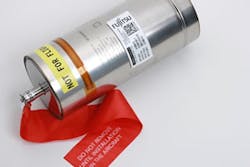Airbus selects Fujitsu RFID integrated label technology for management, traceability of aircraft parts
TOKYO, 20 May 2014. Airbus S.A.S officials in France have named Fujitsu Limited in Tokyo as radio-frequency identification (RFID) solution provider for the Airbus RFID Integrated Labels project. During the manufacturing stage of all Airbus planes, major aircraft components will be individually marked with an RFID label to enable component tracking and accurate traceability.
Airbus and its parts suppliers will be able to trace a component from manufacture to maintenance accurately, enhancing supply chain transparency and visibility of their aircraft parts. Thorough component management is critical in the aircraft industry, especially given that a single aircraft may contain several million separate components.
Traceability is required for every process that the component is involved in over its several-decade life cycle, from design and manufacturing to servicing and disposal. Making this an even more complex challenge is the fact that the aircraft industry encompasses parts suppliers, airframe manufacturers, airlines, and maintenance, repair, and overhaul (MRO), so the tracking process needs to cover multiple companies and even multiple countries, often resulting in excess parts in inventory. Ensuring that each of the numerous components is replaced with the correct article during maintenance is also a time-consuming task for technicians. While there is an urgent need in the airline industry to reduce costs in order to compete with other forms of transportation, there is also a need to ensure that component-tracking and maintenance is performed safely and securely.
To enhance transparency and visibility in its parts supply chain, in 2009, Airbus began using RFID labels on components for its state-of-the-art mid-sized A350 XWB, and expanded their use to all Airbus planes in October 2012. In January 2013, the company decided to move forward on its "Airbus RFID Integrated Label" project, which aims to replace the nameplates that had been used to display component information with highly traceable RFID labels.
In this project, Airbus will be attaching Fujitsu RFID tags to major aircraft components across all Airbus planes. This will make it possible for Airbus and its parts suppliers to confirm manufacturing and maintenance information for each respective aircraft component. Furthermore, making it possible to check storage information on individual parts and inventories at any time enables a top-level component resupply process that shortens delivery lead times, avoids redundant procurement, and optimizes inventory levels, officials say.
Fujitsu RFID Integrated Labels meet the SAE AS5678 standard, applied to aircraft components for quality, and conform to ATA Spec 2000 standard ver. 2013, the data format standard of the aircraft industry.
The labels are available in two types:
1-KB and 8-KB memory, and in three sizes (large/medium/small). Usable with metal and non-metal items, they can be applied to components produced by hundreds of parts vendors around the world. Read range is approximately 1.5 meter, and the labels support the frequency ranges used in the US and Europe.
Fujitsu has also been working to enhance its solution offerings, such as with RFID readers, encoding and printing solutions, and system integration for customers' existing ERPs. This should lead to greater visibility of component-related operations for the entire aviation industry, including parts suppliers, aircraft manufacturers, airlines, and MROs.
Fujitsu is ready to receive orders for labels and all related products, which will be commercially available in the market from 1 June 2014.
SAE AS5678 standard
Issued by the Society of Automotive Engineers (SAE) in December 2006, SAE AS5678 is a standard defining environmental specifications and test methods for passive RFID labels used in aviation applications. SAE has categorized and defined environmental specifications for using RFID labels in the three environmental categories of "Standard," "Robust," and "Harsh."
ATA Spec 2000 standard ver 2013
A standards document promulgated by the Airlines for America that defines information exchange and processing sequences for information regarding aircraft part materials and reliability. Chapter 9 defines requirements for barcodes, 2D codes, and RFID tags affixed to parts.

Courtney Howard | Executive Editor
Courtney, as executive editor, enjoys writing about all things electronics and avionics in PennWell’s burgeoning Aerospace and Defense Group, which encompasses Military & Aerospace Electronics, Avionics Intelligence, the Avionics Europe conference, and much more. She’s also a self-proclaimed social-media maven, mil-aero nerd, and avid avionics geek. Connect with Courtney at [email protected], @coho on Twitter, and on LinkedIn.



